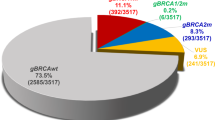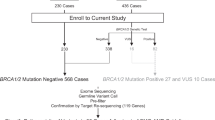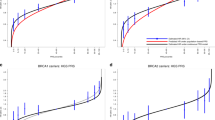Abstract
Estimating the lifetime risk of ovarian cancer in Chinese women with BRCA1/2 germline pathogenic variants (PVs) is of great importance for the clinical management of BRCA1/2 carriers. This cohort study recruited 9903 unselected Chinese breast cancer patients whose BRCA1/2 status was determined. Of these, 3984 probands completed family history questionnaires, which investigated the health status of their relatives, including 11,997 female first-degree relatives. The ovarian cancer risk of BRCA1/2 germline pathogenic carriers was estimated using the ovarian cancer history of proband first-degree female relatives via the Kin-cohort method. Of the 3984 probands, 126 (3.2%) carried BRCA1 PVs, and 183 (4.6%) carried BRCA2 PVs. The estimated cumulative risks of ovarian cancer by age 70 were 15.3% (95% CI 8.4–18.6%) for BRCA1 carriers, 5.5% (95% CI 2.0–10.2%) for BRCA2 carriers, and 0.4% (95% CI 0.3–0.7%) for noncarriers. The cumulative risks of ovarian cancer were very low before the age of 40 for both BRCA1 and BRCA2 carriers and were an increase up to age 45. The cumulative ovarian cancer risk of BRCA1 carriers was approximately three times higher than that of BRCA2 carriers, and BRCA1 and BRCA2 carriers had 38- and 14-fold higher risks than non-BRCA carriers, respectively. The findings indicate that Chinese women with BRCA1/2 PVs have high risks of ovarian cancer in their lifetime, especially BRCA1 carriers. These results are useful for devising optimal strategies to reduce ovarian cancer risk in BRCA1/2 carriers.
This is a preview of subscription content, access via your institution
Access options
Subscribe to this journal
Receive 12 print issues and online access
$259.00 per year
only $21.58 per issue
Buy this article
- Purchase on Springer Link
- Instant access to full article PDF
Prices may be subject to local taxes which are calculated during checkout

Similar content being viewed by others
Data availability
All data and material relevant to the study are available from the corresponding author upon reasonable request.
References
Li A, Xie R, Zhi Q, Deng Y, Wu Y, Li W, et al. BRCA germline mutations in an unselected nationwide cohort of Chinese patients with ovarian cancer and healthy controls. Gynecologic Oncol. 2018;151:145–52.
Dong H, Chandratre K, Qin Y, Zhang J, Tian X, Rong C, et al. Prevalence of BRCA1/BRCA2 pathogenic variation in Chinese Han population. J Med Genet. 2021;58:565–9.
Antoniou A, Pharoah PD, Narod S, Risch HA, Eyfjord JE, Hopper JL, et al. Average risks of breast and ovarian cancer associated with BRCA1 or BRCA2 mutations detected in case Series unselected for family history: a combined analysis of 22 studies. Am J Hum Genet. 2003;72:1117–30.
Chen S, Parmigiani G. Meta-analysis of BRCA1 and BRCA2 penetrance. J Clin Oncol. 2007;25:1329–33.
Chen J, Bae E, Zhang L, Hughes K, Parmigiani G, Braun D, et al. Penetrance of breast and ovarian cancer in women who carry a BRCA1/2 mutation and do not use risk-reducing salpingo-oophorectomy: an updated meta-analysis. JNCI Cancer Spectr. 2020;4:pkaa029.
Risch HA, McLaughlin JR, Cole DE, Rosen B, Bradley L, Fan I, et al. Population BRCA1 and BRCA2 mutation frequencies and cancer penetrances: a kin-cohort study in Ontario, Canada. J Natl Cancer Inst. 2006;98:1694–706.
Mavaddat N, Peock S, Frost D, Ellis S, Platte R, Fineberg E, et al. Cancer risks for BRCA1 and BRCA2 mutation carriers: results from prospective analysis of EMBRACE. J Natl Cancer Inst. 2013;105:812–22.
Gabai-Kapara E, Lahad A, Kaufman B, Friedman E, Segev S, Renbaum P, et al. Population-based screening for breast and ovarian cancer risk due to BRCA1 and BRCA2. Proc Natl Acad Sci USA. 2014;111:14205–10.
Kotsopoulos J, Gronwald J, Karlan B, Rosen B, Huzarski T, Moller P, et al. Age-specific ovarian cancer risks among women with a BRCA1 or BRCA2 mutation. Gynecologic Oncol. 2018;150:85–91.
King MC, Marks JH, Mandell JB, New York Breast Cancer Study Group. Breast and ovarian cancer risks due to inherited mutations in BRCA1 and BRCA2. Science. 2003;302:643–6.
Zhang L, Shin VY, Chai X, Zhang A, Chan TL, Ma ES, et al. Breast and ovarian cancer penetrance of BRCA1/2 mutations among Hong Kong women. Oncotarget. 2018;9:25025–33.
Bhaskaran SP, Huang T, Rajendran BK, Guo M, Luo J, Qin Z, et al. Ethnic-specific BRCA1/2 variation within Asia population: evidence from over 78 000 cancer and 40 000 non-cancer cases of Indian, Chinese, Korean and Japanese populations. J Med Genet. 2021;58:752–9.
Zhang J, Sun J, Chen J, Yao L, Ouyang T, Li J, et al. Comprehensive analysis of BRCA1 and BRCA2 germline mutations in a large cohort of 5931 Chinese women with breast cancer. Breast Cancer Res Treat. 2016;158:455–62.
Sung H, Ferlay J, Siegel RL, Laversanne M, Soerjomataram I, Jemal A, et al. Global Cancer Statistics 2020: GLOBOCAN estimates of incidence and mortality worldwide for 36 cancers in 185 countries. CA Cancer J Clin. 2021;71:209–49.
Wild CP, Weiderpass E, Stewart BW. World Cancer Report: Cancer Research for Cancer Prevention: International Agency for Research on Cancer; 2020. https://publications.iarc.fr/586.
Yao L, Sun J, Zhang J, He Y, Ouyang T, Li J, et al. Breast cancer risk in Chinese women with BRCA1 or BRCA2 mutations. Breast Cancer Res Treat. 2016;156:441–5.
Sun J, Meng H, Yao L, Lv M, Bai J, Zhang J, et al. Germline mutations in cancer susceptibility genes in a large series of unselected breast cancer patients. Clin Cancer Res. 2017;23:6113–9.
Su L, Zhang J, Meng H, Ouyang T, Li J, Wang T, et al. Prevalence of BRCA1/2 large genomic rearrangements in Chinese women with sporadic triple-negative or familial breast cancer. Clin Genet. 2018;94:165–9.
Meng H, Yao L, Yuan H, Xu Y, Ouyang T, Li J, et al. BRCA1 c.5470_5477del, a founder mutation in Chinese Han breast cancer patients. Int J Cancer. 2020;146:3044–52.
Chatterjee N, Wacholder S. A marginal likelihood approach for estimating penetrance from kin-cohort designs. Biometrics. 2001;57:245–52.
Momozawa Y, Sasai R, Usui Y, Shiraishi K, Iwasaki Y, Taniyama Y, et al. Expansion of cancer risk profile for BRCA1 and BRCA2 pathogenic variants. JAMA Oncol. 2022;8:871–8.
Park KS, Lee W, Seong MW, Kong SY, Lee KA, Ha JS, et al. A population-based analysis of BRCA1/2 genes and associated breast and ovarian cancer risk in Korean patients: a multicenter cohort study. Cancers. 2021;13:2192.
Si S, Li J, Tewara MA, Li H, Liu X, Li Y, et al. Identifying causality, genetic correlation, priority and pathways of large-scale complex exposures of breast and ovarian cancers. Br J Cancer. 2021;125:1570–81.
Lee AW, Wu AH, Wiensch A, Mukherjee B, Terry KL, Harris HR, et al. Estrogen plus progestin hormone therapy and ovarian cancer: a complicated relationship explored. Epidemiology. 2020;31:402–8.
Manchanda R, Legood R, Antoniou AC, Gordeev VS, Menon U. Specifying the ovarian cancer risk threshold of ‘premenopausal risk-reducing salpingo-oophorectomy’ for ovarian cancer prevention: a cost-effectiveness analysis. J Med Genet. 2016;53:591–9.
Kuchenbaecker KB, Hopper JL, Barnes DR, Phillips KA, Mooij TM, Roos-Blom MJ, et al. Risks of breast, ovarian, and contralateral breast cancer for BRCA1 and BRCA2 mutation carriers. JAMA. 2017;317:2402–16.
Finch AP, Lubinski J, Moller P, Singer CF, Karlan B, Senter L, et al. Impact of oophorectomy on cancer incidence and mortality in women with a BRCA1 or BRCA2 mutation. J Clin Oncol. 2014;32:1547–53.
Powell CB, Chen LM, McLennan J, Crawford B, Zaloudek C, Rabban JT, et al. Risk-reducing salpingo-oophorectomy (RRSO) in BRCA mutation carriers: experience with a consecutive series of 111 patients using a standardized surgical-pathological protocol. Int J Gynecol Cancer. 2011;21:846–51.
Manchanda R, Abdelraheim A, Johnson M, Rosenthal AN, Benjamin E, Brunell C, et al. Outcome of risk-reducing salpingo-oophorectomy in BRCA carriers and women of unknown mutation status. BJOG. 2011;118:814–24.
Giannakeas V, Sopik V, Shestopaloff K, Iqbal J, Rosen B, Akbari M, et al. A model for estimating ovarian cancer risk: application for preventive oophorectomy. Gynecologic Oncol. 2015;139:242–7.
Acknowledgements
This study was supported by the Beijing Municipal Administration of Hospitals Incubating Program (No. PX2021042) and the National Natural Science Foundation of China (Nos. 81974422, 81772824, 81672625).
Author information
Authors and Affiliations
Contributions
All authors contributed to the study conception and design. YX: Conceptualization, funding acquisition (the National Natural Science Foundation of China (No. 81974422, No. 81772824)), supervision, writing – review and editing. LY: Project administration, funding acquisition (the Beijing Municipal Administration of Hospitals Incubating Program (No. PX2021042) and the National Natural Science Foundation of China (No. 81672625)), data analysis and writing – original draft. LY, JS, LH, JC, JZ, and YX: Data collection and data curation. All authors commented on previous of the manuscripts. All authors read and approved the final manuscript.
Corresponding author
Ethics declarations
Competing interests
The authors declare no competing interests.
Ethical approval
The study was performed in accordance with the Declaration of Helsinki. Approval was granted by the Ethics Committee of Peking University Cancer Hospital (Date: 2011–4–12; No. 2011KT12).
Additional information
Publisher’s note Springer Nature remains neutral with regard to jurisdictional claims in published maps and institutional affiliations.
Supplementary information
Rights and permissions
About this article
Cite this article
Yao, L., Sun, J., Hu, L. et al. Ovarian cancer risk of Chinese women with BRCA1/2 germline pathogenic variants. J Hum Genet 67, 639–642 (2022). https://doi.org/10.1038/s10038-022-01065-6
Received:
Revised:
Accepted:
Published:
Issue Date:
DOI: https://doi.org/10.1038/s10038-022-01065-6



